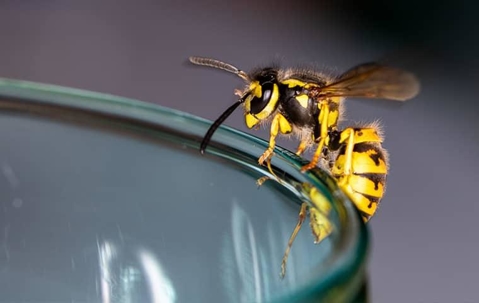At any sight of a flying black-and-yellow insect, we’ve all mastered the correct response – run! If you’re lucky, that striped insect is a simple honeybee, and it won’t sting you unless you’re being a real bother. However, people that aren’t so lucky might be running from one of North Texas’ most dangerous pests: wasps. Wasps are painful critters with aggressive stings, and if you see one around your property, chances are there’s a nest nearby. Before these pests start stinging, let’s go over how to identify wasps and what Fort Worth homeowners can do to prevent them.
Wasp Identification Tips
To the untrained eye, a wasp might be easy to confuse with other types of bees. However, there are a few important distinctions between wasps and bees, including the reason why wasps are much more dangerous.
Fort Worth, TX has three common wasp species: paper wasps, yellowjackets, and bald-faced hornets. Each of these wasps share a few common traits: they have mostly black bodies with some yellow markings, six dark legs, and two antennae. Where honey bees usually have evenly striped, stout bodies, wasps have a less uniform coloring, and their bodies tend to be larger and vary in shape.
On top of these traits, paper wasps grow to about an inch in length and have pinched waists with notably large abdomens. Yellowjackets also have a pinched waist, but they only grow to about half an inch in length and their coloring is notably yellower. Likewise, bald-faced hornets grow to about half an inch, but their bodies are mostly dark brown or black and are much stouter than other wasp species.
Even if you don’t see a wasp, you can recognize them by their nests. Wasp nests tend to be more papery than normal beehives, and though yellowjackets have exposed hexagonal structures in their nest, paper wasps and bald-faced hornets just have smooth, papery hives.
Wasp stings can be incredibly painful; unlike bees which rarely sting and can only sting once, wasps sting repeatedly and will do so if they think their hive is under attack. Many people have normal reactions to wasp stings, which include a raised welt at the site of the sting and a painful burning sensation. However, some people have allergic reactions to wasp stings; mild allergies include nausea and vomiting, while more serious reactions can result in anaphylactic shock. With the threat of repeated stings and extreme reactions, wasps are simply bad news for your Fort Worth home.
What Attracts Wasps?
Though they prefer spaces like the eaves of your roof, porch ceilings, or other overhangs, wasps can build their nests just about anywhere. All wasps really need are two things: food and home building supplies.
Wasps are predators, meaning they feed on other insects. Often, what attracts wasps to your property is a large supply of other bugs to feast on. While this means that wasps help control your pest population, it also means you might have more than just a wasp problem on your property.
Wasp nests are made from a mix of wood fibers and wasp saliva. If a wasp has a large supply of wooden materials to scrape from, it won’t take long before a nest is built. Since wood supplies can be found almost anywhere, the main attraction to your property specifically is a nearby reserve of food.
How To Ward Off Wasps
Because wasps are so aggressive, they’re difficult to remove from your property once they’ve laid anchor. You can prevent these pests (and some painful stings) by doing the following:
- Remove standing water. Wasps need water like any other animal. Removing standing water makes your home less attractive to both wasps and other insects.
- Keep trash and waste inside. Wasps will feed on protein-rich waste. Trash also attracts other insects, which in turn attract more wasps.
- Block common nesting sites. Since wasps prefer to hang off of ceilings and eaves, filling these harborage sites with glass traps or repellants can help control wasp populations.
Still, wasps are both aggressive and flexible to their surroundings, so if they see a reason to build nests near your property they will. When wasps attack your home, don’t try to remove the nest on your own; you’ll only aggravate the pests, making the problem worse and resulting in more nests springing up around the house. Your best bet is to contact Fort Worth’s top wasp exterminators at Greenforest Termite & Pest Control. Learn more about our residential pest management and commercial exterminator programs today.

